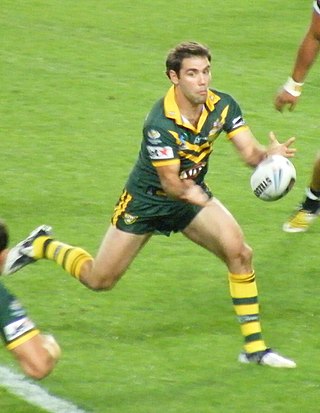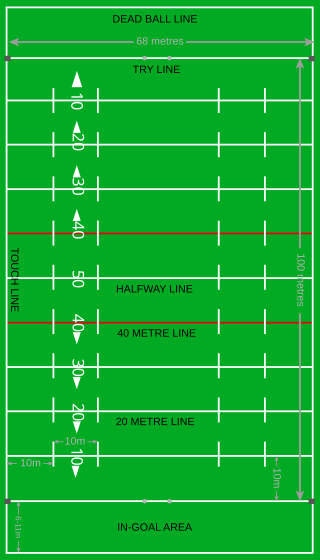Related Research Articles

Canadian football, or simply football, is a sport in Canada in which two teams of 12 players each compete on a field 110 yards (101 m) long and 65 yards (59 m) wide, attempting to advance a pointed oval-shaped ball into the opposing team's end zone.
A drop kick is a type of kick in various codes of football. It involves a player intentionally dropping the ball onto the ground and then kicking it either 'as it rises from the first bounce' (rugby) or 'as, or immediately after, it touches the ground'.

A touchdown is a scoring play in gridiron football. Scoring a touchdown grants the team that scored it 6 points. Whether running, passing, returning a kickoff or punt, or recovering a turnover, a team scores a touchdown by advancing the football into the opponent's end zone. More specifically, a touchdown is when a player is in possession of the ball, any part of the ball is in the end zone they are attacking, and the player is not down.

A free kick is an action used in several codes of football to restart play with the kicking of a ball into the field of play.

A try is a way of scoring points in rugby union and rugby league football. A try is scored by grounding the ball in the opposition's in-goal area. Rugby union and league differ slightly in defining "grounding the ball" and the "in-goal" area. In rugby union a try is worth 5 points, and in rugby league a try is worth 4 points.
In rugby football, the penalty is the main disciplinary sanction available to the referee to penalise players who commit deliberate infringements. The team who did not commit the infringement are given possession of the ball and may either kick it towards touch, attempt a place kick at goal, or tap the ball with their foot and run it. It is also sometimes used as shorthand for penalty goal.

Like most forms of modern football, rugby league football is played outdoors on a rectangular grass field with goals at each end that are attacked and defended by two opposing teams. The rules of rugby league have changed significantly over the decades since rugby football split into the league and union codes. This article details the modern form of the game and how it is generally played today, although rules do vary slightly between specific competitions.

A comparison of American football and rugby union is possible because of the games' shared origins, despite their dissimilarities.

A drop goal, field goal, or dropped goal is a method of scoring points in rugby union and rugby league and also, rarely, in American football and Canadian football. A drop goal is scored by drop kicking the ball over the crossbar and between the posts of the goal posts. After the kick, the ball must not touch the ground before it goes over and through, although it may touch the crossbar, the uprights or an opponent. A drop goal in rugby union is worth three points, and in rugby league a drop goal is usually worth one point.

Rugby union is a contact sport that consists of two teams of fifteen players. The objective is to obtain more points than the opposition through scoring tries or kicking goals over eighty minutes of playing time. The play is started with one team drop-kicking the ball from the halfway line towards the opposition. The rugby ball can be moved up the field by either carrying it or kicking it. However, when passing the ball it can only be thrown laterally or backward. The opposition can stop players moving up the field by tackling them. Only players carrying the ball can be tackled and once a tackle is completed the opposition can compete for the ball. Play continues until a try is scored, the ball crosses the side line or dead-ball line, or an infringement occurs. After a team scores points, the non-scoring team restarts the game at the halfway with a drop kick toward the opposition. The team with the most points at the end wins the game.

The place kick is a type of kicking play commonly used in American football, association football (soccer), Canadian football, rugby league, and rugby union. It was historically used in Australian rules football, but it was phased out of the game more than 100 years ago.
This is a general glossary of the terminology used in the sport of rugby union. Where words in a sentence are also defined elsewhere in this article, they appear in italics.
Rugby league football has accrued considerable jargon to describe aspects of the game. Many terms originate in the Laws of the Game. Some aspects of the game have more than one term referring to them. Different terms have become popularly used to describe an aspect of the game in different places, with notable differences between the Northern and Southern Hemispheres.
A penalty in rugby union is the main disciplinary sanction available to the referee to penalise a team who commit deliberate infringements. The team who did not commit the infringement are given possession of the ball and they may either kick it towards touch, attempt a place kick at goal, or tap the ball with their foot and run. It is also sometimes used as shorthand for penalty goal.

The rugby league playing field, also referred to as a pitch or paddock, is the playing surface for the sport of rugby league football and is surfaced exclusively with grass.
A comparison of Canadian football and rugby union is possible because of the games' shared origins, despite their dissimilarities.

The laws of Rugby Union are defined by World Rugby and dictate how the game should be played. They are enforced by a referee, generally with the help of two assistant referees.

Comparison of association football (football/soccer) and rugby union is possible because of the games' similarities and shared origins.

A free kick is a method of restarting play in association football. It is awarded after an infringement of the laws by the opposing team.
References
- ↑ "How To Do A Rugby Drop Kick". Rugby Kicking Academy. Archived from the original on 3 August 2018. Retrieved 3 August 2018.
- ↑ "Kicking: The Drop Kick" at www.coachingrugby.com. Retrieved 11 October 2007.